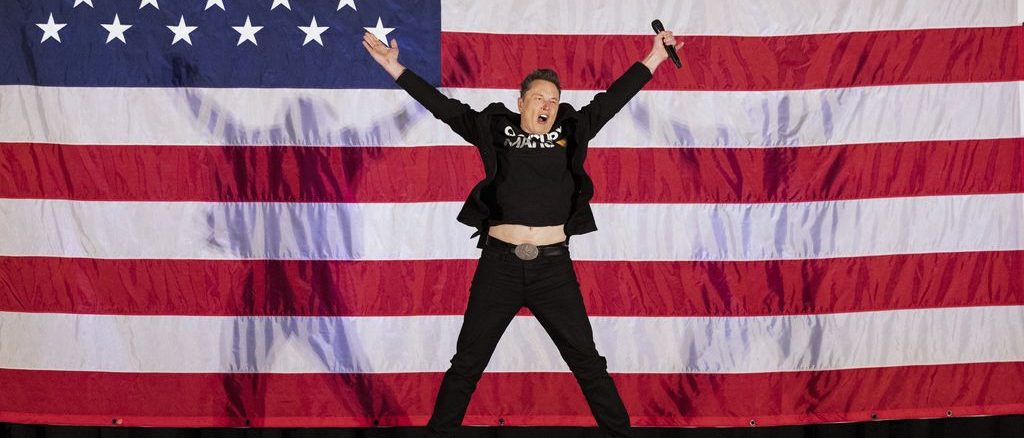
Unbridled tech power in the US? ‘Incredibly threatening to Europe’
Elon Musk on an important post, make way for it cryptocurrency and a regulator who is against supervision: incoming President Donald Trump seems to want to take a radical course in the field of tech.
Trump’s promises and the plans being floated under his new government appointments go far, but do they have a chance? And should Europe be concerned?
An oligarchy of politics, tech and capital is emerging in the US.
Marleen Stikker
Either way, the tech industry’s political influence will increase in the US, experts say. “The interests of Silicon Valley will play a major role in the next four years,” said Ryan Mac, tech journalist at The New York Times. “Vice President J.D. Vance himself worked for venture investors in Silicon Valley. Peter Thiel was his mentor and launched him as a vice presidential candidate.”
Thiel is an important person in understanding what the relationship between the tech industry and the White House could look like in the future. He is a major investor in Silicon Valley, has a lot of influence there and is known as one of the thinkers behind the growing political power of tech.
“He is known for his statement that democracy is incompatible with freedom,” says Marleen Stikker, director of research institute WAAG Futurelab. “That’s kind of the basic thinking of Silicon Valley: anti-government and anti-democracy. There is a great belief that technology can solve it all. Thiel believes in a strong leader like Trump.”
The fact that this idea will soon enter the White House via Trump means “a new era”, says professor Claes de Vreese (University of Amsterdam). He investigates the relationship between tech, media and democracy. “That relationship, at least in the US, suddenly becomes very different.”
In recent years, politicians, both here and in the US, have wanted to curb the power of tech. The European Union introduced the Digital Services Act and a AI law, which aims to protect citizens against data misuse, dangerous content and disinformation. De Vreese: “There was also discussion in America: should we impose rules on the Googles, Facebooks and Apples, just like companies in the financial and medical sectors? There was a huge lobby to stop those rules.”
There are also lawsuits initiated to tackle the monopoly position of large tech companies. Stikker: “In all kinds of ways, big tech has been pushed back by the Democrats.”
X and Musk are completely intertwined with the political movement of the future president.
Professor De Vreese
With Trump, tech has now won a crucial battle in that battle. During his campaign he already promised to remove regulations for tech companies, to purchase cryptocurrencies en masse and to introduce new regulations for Artificial Intelligence. to withdraw.
Silicon Valley is happy. “Deregulation of blockchain and crypto technology is important for tech companies,” says tech professor James Grimmelmann (Cornell University). “And they are happy with a government that lets companies do what they want.”
Against ‘censorship’
Trump appointed tech billionaire Elon Musk to a government efficiency agency to lead. And he chose a media regulator who is strongly opposed to online moderation, just like Musk and Thiel. Stikker: “Online platforms have rules against disinformation and harmful content. These men call that censorship.”
Musk and Thiel advocate total freedom to say what you want online. But to whom will this absolute freedom apply, says Professor De Vreese. “Musk bought Twitter because he wanted less interference; X was supposed to be a free town square. But now, two years later, X and Musk are completely intertwined with the future president’s political movement.”
‘Tech overestimates itself’
For the time being, all ideas about deregulation, crypto and AI are just that: ideas. “The tech sector wants to make government more efficient, but tech is known for overestimating itself,” says Grimmelmann.
Yet experts have no doubts about the rise of tech power. “How is an open question,” says De Vreese. It will be important whether the EU is strong enough against the tech sector without US support. De Vreese: “Tech companies are now still acting somewhat in accordance with EU rules. The Brussels effect has positive consequences for the rest of the world.”
Stikker is not happy about it. “The oligarchy that is emerging in the US of politics, tech and capital is incredibly threatening to Europe. Most social media companies are American and the Dutch government is in the American cloud. The Hague wants to cut back on innovation and knowledge, that is exactly the wrong development “We have to invest much more in technology ourselves, so that we have strategic autonomy again.”

Be the first to comment